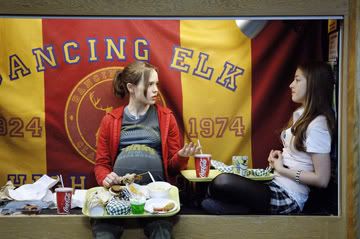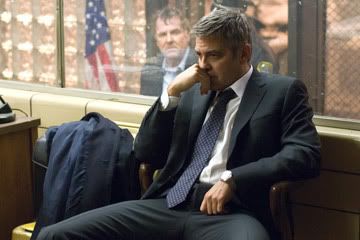 Director: Ridley Scott
Director: Ridley ScottStarring: Denzel Washington, Russell Crowe, Chiwetel Ejiofor, Josh Brolin, Lymari Nadal, Ruby Dee, Carla Gugino, Clarence Williams III, Cuba Godding Jr., Armande Assante
Running Time: 157 min.
Rating: R
***1/2 (out of ****)
The gangster film genre has become so familiar in American cinema that it could very well be considered an institution, or a cliché. When the 80th Annual Academy Award nominations were announced earlier this year a lot of people who surprised that American Gangster only picked up two nominations (one for Best Supporting Actress and another for Best Art Direction), despite being universally praised by critics and audiences upon its release as one of the best films of the year. Under normal circumstances two nods would hardly be considered a disappointment, but it is when you have an epic crime drama directed by Ridley Scott starring two actors the caliber of Russell Crowe and Denzel Washington. It is "EPIC" in every sense of the word and exactly the kind of film that wins little gold men, which made it's exclusion at awards season that much more surprising.
In taking pages out of similar films like The Godfather, Goodfellas and Scarface by telling a very familiar, comfortable story, the film could have seemed like a pale imitation, but instead feels like the real thing because it presents the material in a fresh, interesting way and the trajectory of the story goes in a different direction. It's also breezier and more accessible than those other films, which many may view as a negative. I don't. Nor do I care that serious creative liberties were taken with the original story because I think this is one of those cases where a little embellishment adds more dimension and flavor to the characters, which deepens the film.
Anyone who lives for gangster and crime movies (I'm sorry to report I'm not among them) will absolutely love this, while everyone else will at least be entertained thoroughly for over two and a half hours with first class filmmaking. It's chief selling point is the prospect of seeing Crowe and Washington lock horns onscreen for the first time since 1995's forgettable Virtuosity. It doesn't disappoint at all on that end and delivers on many other fronts as well, especially in regards to Washington's performance, which is one of his most electric and powerful in years. I'm not sure if it's a movie we couldn't live without, but it will provide a lot of enjoyment for fans and non-fans of the genre.
Washington is Frank Lucas, the protégé and right-hand man of "Bumpy" Johnson (Clarence Williams III), a gangster who runs much of the drug trade in late 1960's Harlem. When he passes away from a heart attack, Frank takes over the reins, cornering the drug market and putting the competition out of business. The secret to his success is a new purer from of heroin coming out of Bangkok, of which he controversially smuggles out of Vietnam using U.S. troops and equipment. Frank's rule over the Harlem drug trade puts him at odds with the Italian mob, led by Dominic Cattano (Armand Assante) and a flashy, loudmouth dealer Nicky Barnes (Cuba Gooding Jr.) trying to pass his brand off as his own. But his biggest adversaries are the city's crooked cops trying to get a cut in the action, the worst of which is the creepy, intimidating Detective Trupo (Josh Brolin).
It seems the only cop in New York not on the take is Richie Roberts (Russell Crowe) who actually turned down a $1 million payoff, which makes him a joke among his co-workers. He's also plagued with personal problems as his partner slides into drug addiction and his ex-wife (Carla Gugino) is suing him for custody of his son. Soon he's selected to head up a new narcotics squad and it isn't long before he has his sights set on Frank and his men. The movie tells juxtaposes the stories of these two men throughout and prepares us for the inevitable showdown in the third act. Scott knows what he has and milks it for everything he can, as Crowe and Washington don't share a single scene together until the last 10 minutes of the film. It's worth the wait though. And if you're expecting this film to end in a firestorm of bullets and taking bets on which man will survive you're approaching this story from the wrong angle, just as I was.
Frank Lucas is one of the most compelling characters you could hope to build a film around because he is, like this genre's best, complicated and full of contradictions. He wants to run the show but hates flashiness. He demonstrates cold-blooded ruthlessness when it comes to business but he's ultimately he's very fair and loyal . He endangers his wife (Lymari Nadal) and mother (Best Supporting Actress Oscar nominee Ruby Dee), yet does everything he can to protect them. He cares for his brother (Chiwetel Ejiofor) but doesn't have time for his stupidity. Nothing is black and white with Frank, which is what makes the character so fascinating and engaging.
I've criticized Washington in the past for taking junk cop parts in films like Out of Time and Déjà Vu because we know he's always been capable of so much more. Here he shows us that and these are exactly the kinds of roles he should be taking. Of all the nominations this film was supposedly robbed of you could have made the strongest case for Washington for a Best Actor nod. At times you're mad at him for playing Frank so charismatically because he makes this drug dealer and murderer somewhat likable, which creates conflicting feelings as you watch.
The common thread he shares with Crowe's Richie is their belief in fairness and honesty even though they're operating on opposite sides of the law. They're practically cut from the same cloth, which makes their eventual encounter at the end of the film work so well and go in a different direction than anticipated. The sub-plot involving Richie's ex-wife and the custody battle is a screenwriting invention since the real Richie Roberts didn't have a child, but it does lead to an interesting courtroom scene where we're asked to question the motivations behind Richie's honesty and whether he really is as great of a guy as he makes himself out to be. Crowe turns in a good performance as well even if his story fails to pack the same emotional punch as Frank's. But it's not meant to, nor could it.
There's been a big question concerning whether Ruby Dee "deserved" a Best Supporting Actress nomination for her five minutes of screen time in this film. Whether she does or not depends largely on how you feel about the Academy's policy of rewarding an actor or actress for their life's work as opposed to the performance they happened to be nominated for. That's clearly what happened here, but I have a feeling the Academy unintentionally did her more harm than good by making her look like a charity case instead of an actress who gave a dynamic supporting performance worthy of award consideration. Anyone who's seen her work over the years knows she's no charity case. Having said that, she does give a reasonably strong performance in a woefully underwritten role.
If a supporting nomination should have gone to anyone it should have been Josh Brolin who plays what could have been a stereotyped crooked cop without pretension and gives a cold, calculated performance that cuts into the very heart of the picture. With a single icy stare he can imply things about this man that no line of dialogue is capable of. Between this, Planet Terror and No Country For Old Men (which I've yet to see) 2007 should be remembered as his breakout year. And to think just a couple of years ago the only project any of us would be interested in seeing him in would have been The Goonies 2.
It was a big shock when Cuba Gooding Jr, appeared onscreen because this must mark the first time in who knows how many years this guy has acted in a film of any value. It's sad but true. After the choices he's made since his 1997 Best Supporting Actor victory it's a miracle a director like Ridley Scott would even consider casting him in even a small role like this. No actor's stock has fallen further after an Oscar victory than his so hopefully this marks the beginning of a turnaround because he at least does a decent job with what he's given here. With all the big names in the cast this could have degenerated into a game of "spot the star" but it doesn't as all the supporting players slip into their roles seamlessly. But the most support comes from director of photography Harris Savides who can now say after this and Zodiac that he shot two of the best looking films of the past year. The costume design and a perfect late 60's soul soundtrack don't hurt the movie's cause either.
American Gangster continues an trend we've been seeing throughout 2007: The "throwback" film. Movies like Eastern Promises, The Assassination of Jesse James By The Coward Robert Ford and Michael Clayton are all movies that could have been playing at a theater near you during the 1970's. But rather than just simply ripping off films from that decade these seem genuinely inspired by them and play like respectful, authentic tributes (some more than others). It's a trend that I hope continues because if there's a decade in filmmaking you want to mimic it's that one. Scott clearly did his homework here and his use of a montage that juxtaposes drug overdoses with a Thanksgiving dinner he'd have to admit is right out of Coppola's playbook.
He's a director that can pretty much do anything, even if I'm more than a little worried how he'll pull off the proposed film adaptation of the board game Monopoly. But that doesn't mean I don't want to see him try it. As someone who isn't a fan of the crime or gangster genre it says a lot that I found myself captivated for two and a half hours by a film that didn't drag its feet at all and had more than enough story to justify its running time. American Gangster may not be a complete original, but they do say imitation is the sincerest form of flattery. That's especially true when it's done this well.

















